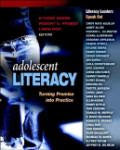To begin, I like the idea of "flow" ("experiencing something so intensely that nothing else seems to matter") and I think this is what we're all trying to do with texts; get kids to be so engaged that they're at maximum learning potential. I know that I want to create a learning environment where everyone can experience "flow". (I think this is actually one of the reasons I decided to become a teacher- because when I was doing it I was so happy and involved that I lost all track of time...I was in the "flow"...so I knew if I could do this job that I loved, it would be a very good thing...and it still is!)
This chapter reminded me how important it is that all students, and especially boys, understand a clear purpose or at least why an activity/assignment has value. As we head into a new school year, I will be thinking about how to get the "buy-in" by showing students why experiencing texts is important.
I really liked the idea of developing inquiry units and reading different texts around a "common question". The premise sets a teacher up nicely as facilitator of motivated, self-directed learners. It also naturally allows students to seek out a variety of texts and collaborate as answers and approaches come together. I agree that inquiry units also provide the opportunity to combine skills to be taught (essay writing, grammar, theme) thus saving time and maximizing similarity to real-life applications as skills are used in sets rather than in isolation.
Following Sharon's current focus on revamping our texts, this chapter also encourages us to "widen our notion of texts" and consider what may be captivating- fantasy, mystery, magazines, graphic novel, etc. Most importantly, we need to select texts that utilize pre-existing schema or interest or expertise so that kids feel successful while they explore and make meaning.
It's common sense but a good reminder: "Who enjoys feeling dumb all the time?" We need to ensure that our lessons follow Wilhelm's five M's of promoting competence: "model, mentor, monitor, and provide multiple modalities and measures". Reflecting on my own practice, I know I can always push myself further to ensure that every kid is feeling like a success in English. I need to start checking for that "correspondence concept" at the end of each semester so that I can check that my students are progressing towards becoming competent readers and learners.
I'm sure that many of the boys I teach at Century have a "damaged learner identity" and that, oftentimes, our English teachers (including myself) need to do quite a bit of repair work and building up of their self-esteem as learners. Our kids need to have a "virtual identity" as a reader, researcher, analyst, etc. so that they can "build the bridge" to success with increasingly difficult texts.
Overall, I'm finding that the timing of this book study is perfect as I'm considering this text as I plan for September.
:)
Natalie
Friday, August 15, 2008
Subscribe to:
Post Comments (Atom)

1 comment:
I can relate to your flow experience! I knew I was in the flow in this job when I didn't think about paychecks - in fact I was always surprised that was actually being paid for this job :-)
Post a Comment